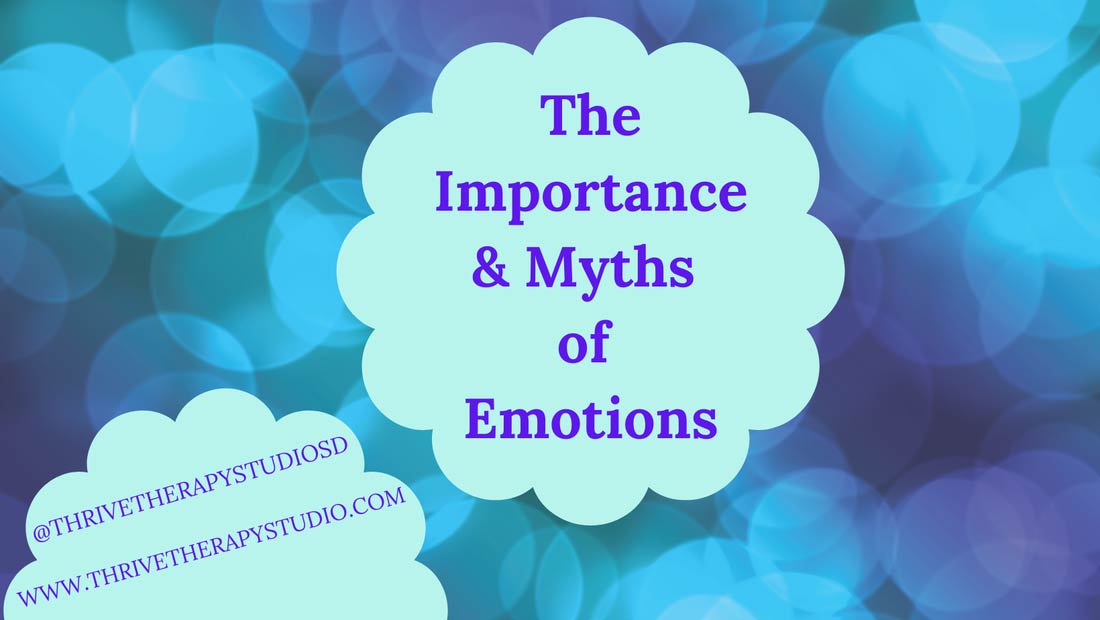I like to think about the ways we think about emotions. Emotions are often labeled as good or bad, positive or negative. Instead of seeing emotions as this good and bad dichotomy, I like to refer to them as pleasant or unpleasant. This helps remove the idea that there are certain emotions that should be avoided, but rather, some just aren’t our favorite to feel. There is so much value to these unpleasant emotions too! They serve a variety of purposes and are so necessary to being a human. Dr. Marsha Linehan is a clinical psychologist who has done a significant amount of research on the functions and myths about emotions. There are several emotion myths (such as emotions being bad), but before I share those, I think it is important to understand the functions of emotions.
They motivate us for action. Emotions push us to do things. For example, anxiety might help push a student to finish their assignment. Anxiety itself here isn’t “bad”, rather it just helps the student get things done. If we feel happy while doing something, such as feeling happy when exercising, it encourages us to engage in the activity more.
They communicate something to others. Emotions result in facial expressions which can communicate a lot to someone in a very short amount of time, such as giving a smile or furrowing a brow.
They communicate something to ourselves. For example, fear can clue us in that the situation we are in is not safe.
Emotions are so important! They are constantly motivating us to action and communicating things to ourselves and others throughout the day. As I mentioned above, there are various myths about emotions that tend to cloud their importance. Below are some of the most common myths of emotions Dr. Linehan has written on.
1. There is a right way to feel in every situation. Have you ever found yourself saying “I shouldn’t feel this way?” I definitely have. I have found myself judging myself for having a certain emotional reaction. However, this is not the most helpful way to think about emotions. There is no right or wrong emotion to have in a certain situation. Instead of blaming yourself, you might try acknowledging that you are having the emotion without any judgment for feeling it.
2. Being emotional means being out of control. Feeling a wide range of emotions means you are a human! Emotions do not necessarily lead us to act in a certain way. While they can motivate us to take action, we still have control over how we respond. There is a cliché that I really like to think about. It says that all emotions are okay, but all behavior is not. Luckily when we feel an intense emotion, our impulse control is often there to keep us from acting on it.
3. Some emotions are stupid. While there are some emotions that are far less pleasant than others, they are all important. A common example is feeling sad. Someone might say “it’s stupid of me to feel sad right now”. But, is it? Instead, I might encourage them to take time to think about what might be leading them to feeling sad. I think any emotion can clue us into what else might be going on.
Emotions should always be trusted. As I mentioned above, even though emotions communicate something to us, that communication is not always accurate. For example, if you feel anxious, that does not always mean the situation you are in is not safe. Sometimes our emotions are either over heightened or subdued. I think there is a lot of value in trying to balance both one’s emotions with one’s ability to think through a situation. This balance can help one make more informed steps when deciding what to do next.
Instead of viewing emotions as things that should be suppressed, I would encourage you to embrace them and be curious about them. I hope you are able to see the importance of emotions and ways they are part of what makes us human. To learn more about Dr. Linehan’s work, you can check out her DBT Skills Training Handouts and Worksheets manual. You can also learn more about Dr. Linehan’s story and her development of Dialectical Behavior Therapy in her memoir Building a Life Worth Living.
Reach out to start
your healing journey


